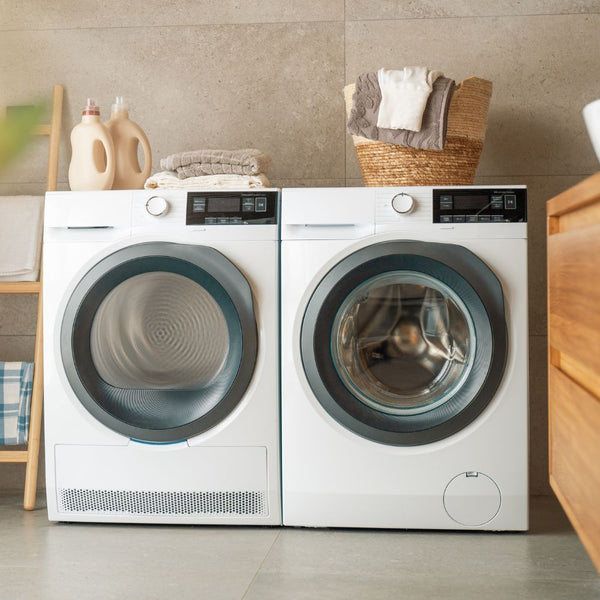
The holiday season is a great time to be shopping for a new dryer, especially with Black Friday sales just around the corner. Before you shop, remember to reevaluate your dryer needs, figure out which kind of appliance hookups you have, and set a budget. To make things easier, we’ve compiled information for you on how to choose between a gas and an electric dryer.
What’s the Difference Between Gas and Electric Dryers?
Though gas and electric dryers perform the same exact functions, they do so with different energy sources. Electric dryers use electricity for power and heat, while gas dryers use electricity for power and gas for heat. Learn more about how gas and electric dryers differ below.
Price and Utility Costs
There are two main ways that your appliance will cost money: in the initial price tag and in your monthly utility expenses. Let’s start with the initial cost.
Gas dryers are usually more expensive than electric dryers. Some online reviewers estimate that the average difference is about $100 to $300, all other things being equal. We’ll talk more about why gas dryers are more expensive below, but for now, just know that you’ll need to budget a little higher than you would for an electric model.
The other major cost to consider is utilities. How much you pay for gas versus electric power is going to depend on where you live and which settings you use on your machine. Gas dryers have higher heat settings than electric ones (more on that in a bit), but that also means they don’t need to run for as long.
Depending on utility costs where you live and which model you purchase, it can take anywhere between one to five years to recoup the higher upfront cost. Some of this will also depend on how often you use your machine.
Drying Performance
One major difference between gas and electric dryers is that the former runs hotter. Some people advocate using gas dryers because the hotter temperatures dry clothes faster with less energy. However, hotter temperatures are not good for every type of fabric, so be sure to check the care instructions on your clothing.
If you find yourself doing laundry frequently and in large loads, a gas dryer may be more time efficient since it works faster. For towels and non-shrinking clothing, the faster speed means you can do more loads and use up less energy in the process.
Extreme Weather
People often think gas dryers are better for emergency preparedness. If something happens to your electricity, people assume that a gas dryer will continue working. It’s important to note that a gas dryer still uses electricity to turn on—it only uses gas for the heating element. So, if you’re trying to prepare for extreme weather, a gas dryer is not any better than an electric one.
Maintenance and Installation
Another cost to keep in mind when choosing between a gas and an electric dryer is whether or not you’ll need a licensed technician to help you. For installation, an electric dryer is by far the simpler appliance. You simply need to plug it in and align the vent hose—no technician required.
A gas dryer is a little trickier. Gas dryers require a connection to a propane or natural gas line. If put together incorrectly, you can end up with a gas leak in your home, which is extremely dangerous. Natural gas and propane are highly flammable, and they can cause negative health effects if you inhale them. To install a gas dryer, you’ll always need to hire a certified technician.
Once you start using your machine, you’ll inevitably run into problems at some point. With electric dryers, you can sometimes fix the problem yourself, especially if it just needs a replacement cord. However, with a gas dryer, you’ll want to call in a repairman because of the plumbing lines.
Environmental Impact
The difference in power sources also determines how dryers impact the environment. While most electricity comes from fossil fuels at power plants, electrical technology is getting greener every year. Machines now take much less electricity to run, and they don’t necessarily lose heating capability. You can reduce the burden on the environment even further by installing solar panels on your roof.
Gas is a little harder to measure. Individual gas dryers produce carbon dioxide, which leaves through the ventilation system and (in a working machine) does not enter back into your home. However, that carbon dioxide does contribute, however imperceptibly, to the greenhouse effect. Researchers are also starting to measure the effects of gas leaks in urban communities on the environment, but these studies don’t have any conclusive findings for appliance owners just yet.
How To Know Which Kind of Hookup You Have
One factor that will likely impact your decision to purchase a new machine will be the kind of hookups you already have. You can look at your current dryer to see whether it has a power plug-in or a plug-in and a pipeline attachment.
If you’re unable to see your machine’s hookups, it’s best to call in a technician to have a look. You can also try to find your machine’s model number and look it up online.
Installing New Hookups
If you want to switch types of dryers, you may need to have a technician install new hookups. An electric dryer typically requires a 240-volt outlet, which can be several hundred dollars depending on the labor. A gas line is usually more expensive to install, with some high-end estimates reaching $1,000 or more. It really depends on how your house is built and how easy the installation is for the technician.
Which Machine Is Best for You?
The type of dryer you choose will largely depend on what kind of hookups you already have unless you’re shopping for a new home or are willing to pay for hookup installation. Then, your next consideration is likely the amount of laundry your household does each week. If you don’t do laundry very frequently, then an electric dryer is probably fine. If you’re doing multiple large loads every week, then you will likely appreciate the efficiency of a gas dryer.
As far as other factors go, the cost is certainly a consideration, as is sustainability. Unfortunately, the impact of individual gas dryers is harder to measure than electric ones, making them difficult to compare on this front. With cost, the higher upfront price of a gas dryer is much easier to accept if you know you’ll be getting lots of use out of the machine.
Once you’re ready to start looking for gas dryers for sale, head on over to our online storefront at Town Appliance. We carry many major brands like GE, Maytag, Samsung, Whirlpool, and LG in both top- and front-loading varieties. We also have machines with drying racks and stainless steel drums and ones that meet ADA compliance. Call or email us today if you need help finding the right gas dryer.







